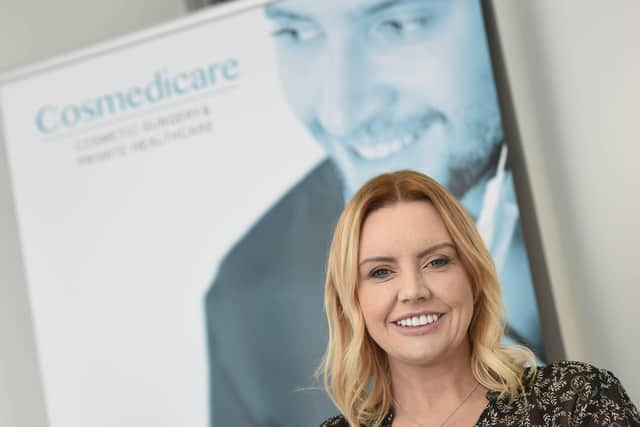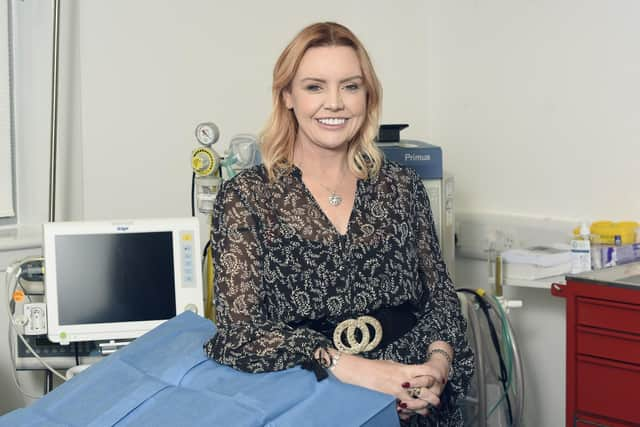The Big Interview: Gill Baird, MD and founder of Cosmedicare
She says the business is in fact Scotland’s only female-owned and operated cosmetic surgery company – which claims to unite some of the country’s top consultant plastic and reconstructive surgeons, consultant anaesthetists, and senior theatre teams. Its sites include Edinburgh, Glasgow, Bothwell and Stirling.
Tell us about your early career path...
I left school at 16 with no qualifications. Being from an entrepreneurial family with a strong work ethic, I wasn’t allowed to sit about so my grandmother facilitated my first steps into business by encouraging the idea of a tanning salon. My uncle helped massively, fitting out what had been a dilapidated launderette in the East End of Glasgow. Within five years it evolved into a seven-salon chain, with exclusive distribution rights across Scotland for the industry-leading tanning products and a subsidiary subbed maintenance arm. We sold up when I was 21 (most of the salons are still open too).


Advertisement
Hide AdAdvertisement
Hide AdI wasn’t sure what I wanted to do next, so did some temp work, including a stint in Barlinnie prison working with the team overseeing the first outsourced prisoner escort contract. I learned a lot about business processes and then developed this by working for an international transport management company.
I then signed up to the University of Strathclyde’s entrepreneurial course backed by Sir Tom Hunter at the business school. I later got a place on the MBA course in business and marketing at Stirling University. I was awarded an MBA with distinction as a result of the Leader of the Future scholarship award, the only full MBA scholarship in the UK.
Before I’d even completed the MBA, I was approached to interim manage the Edinburgh Clinic run by Aspen Healthcare. This in turn led to setting up Cosmedicare, which operated initially like a concession until I broke away and set up on my own in 2016.


I always knew I wanted to work within a sector that was able to help people, although I am not medically trained or involved in the physical side of healthcare delivery. I realised from my experiences working with medics that patients often don’t have much input into their care or realise the difference between what differentiates a good medical service from a great one.
How has the business progressed since then?
We’ve been fortunate enough to experience exponential growth since inception. Both our scope and scale of services have increased simultaneously. When we started out, we focused purely on private elective cosmetic surgery, but with the extensive skillset within our team, and the range of procedures they treat within their NHS positions, it was inevitable that we would expand into offering more complex medical and reconstructive services.
This combined with expansion into private GP services, transgender medical and surgical services, and other medical disciplines, has seen our brand transform into a more diverse private healthcare provision with a unique approach to patient care. They are now run as two distinct businesses.
Who is the typical client?
People get the wrong idea about those coming to see us for cosmetic work. We deal with people who may have experienced botched jobs or suffered injuries that have left them feeling insecure about their appearance, just as much as women wanting bigger boobs for purely aesthetic reasons.
They are normal people who just want to feel better and more confident. It is not for other people. It's for themselves. Lockdown has also put people under a lot of pressure and I see people who just want a bit of a lift.
Advertisement
Hide AdAdvertisement
Hide AdClients are usually insecure or embarrassed about something that they don't feel comfortable about. They are mainly women but more and more men are looking to reduce their breast fat, pin back their ears, or fix a nose broken on the rugby field.
There are big differences between women and men. Women are more used to visiting spas and salons for various treatments and tweaks but men have not had a regular maintenance programme in place. I see that changing.
You’re due to open St Ellen’s, a state-of-the-art private day case hospital. It’s an ambitious project – what led you to take this step?
It was a deep-rooted inferiority complex on my part. I wanted to prove we could do it. From a business perspective we needed to expand, as we quickly outgrew our surgical centre in Edinburgh Park, and needed full access to our own general anaesthetic theatres that we wouldn’t have to share with anyone else. This takes away scheduling and logistical issues we’d experienced pre-Covid, which have been further exacerbated post-pandemic, so you could say this project was perfect timing.
The only way to secure uninterrupted general anaesthetic theatre access was to build a hospital. It sounds a massive undertaking, and it is, but it was also the next logical step for us. We’re just about nearing completion of the build and are already planning expansions to the Livingston site and sourcing other sites across the country for further expansion.
Where do you see the business in another five years?
Aside from expanding St Ellen’s, there are so many opportunities. The opening of our new hospital in Livingston this summer has expanded our horizons in so many ways. The hardest decisions are related to which opportunities to pursue, whether it be widening our surgical specialties, facilitating NHS and private healthcare insurance services, incorporating overnight facilities. Each one has its pros and cons. We will be recruiting more staff as I expect the business to continue expanding.
Just before the pandemic hit, we launched Scotland’s first fully accredited and insured gold standard training academy and mentorship programme for medics and non-medical professionals looking to practise in aesthetics and cosmetic surgery. We also founded the Cosmedicare Trust to deliver financial support for private care for gender affirming and elective reconstructive surgery. I want to scale both initiatives.
What have been the main challenges to growing your business?
Advertisement
Hide AdAdvertisement
Hide AdAside from the usual hurdles in relation to staffing and finance, the biggest challenge has been changing the culture of private healthcare in the UK – not just to the general public, but also within our own team.
We focus purely on the patient. Each individual patient has different needs, different objectives. It’s not a one-size-fits-all service. From initial enquiry, to consultation, day of surgery, immediately post operatively and for the longer period of recovery, we offer a very hands-on experience, meaning our team has had to adapt, as it’s very different to how they’ve worked elsewhere.
Financing St Ellen’s was a challenge at points and we struggled with bank finance, which I wanted in order to take pressure off me. I applied for help though a women’s fund, but we didn’t fit their criteria, so the project is self-funded.
You recently posted profits of £500,000 despite Cosmedicare being closed for most of last year, how did you navigate the pandemic?
Again, our culture of community has seen us through. We may have been physically closed for four months, but communication remained open allowing those interested in our services to research, plan and pre-schedule procedures for when restrictions lifted. Our medical arm of the business also allowed us to continue to offer some services. We’ve built up a pipeline of bookings that are now coming through.
How do you think people view you?
I’m very hands on and quite stubborn. I have softened over the years, though that stubbornness has also made me determined to overcome obstacles.
What has been the most pivotal moment in your career to date?
There have been many, but personally being able to facilitate transgender services is one of the most rewarding parts of this journey. As the mother of a trans girl, we’ve experienced the hurdles first hand, so being able to deliver safe, compassionate care to the community has personally been an honour for me.
Advertisement
Hide AdAdvertisement
Hide AdBusiness growth wise, the building of St Ellen’s has been phenomenal, stressful and challenging, but unbelievably satisfying. It’s no longer a case of what we bring to the table. Now we are the table, which is not only flattering and empowering, but also needed to really facilitate change in the UK private healthcare industry. It’s been the same old boys’ club for way too long.
You launched the Cosmedicare Trust before the pandemic and actively support the LGBT community. Inclusion is important to you, can you tell us why?
I make no secret about my personal affiliation with the trans community… However, prior to even this, I worked within gender services for the NHS and saw from a different perspective the challenges, delays and frustrations the trans community experience.
Whilst we cannot offer free treatment or surgery, we can incorporate this into our ethical and social responsibility commitments, and this is what has formed The Cosmedicare Trust. We help people from all walks of life, not just LGBTQ, but also men and women who have experienced violent crime and domestic abuse, and other physically altering experiences. Having the ability to offer this is rewarding for all of us and is one of our proudest achievements as a company.
A message from the Editor:
Thank you for reading this article. We're more reliant on your support than ever as the shift in consumer habits brought about by coronavirus impacts our advertisers.
If you haven't already, please consider supporting our trusted, fact-checked journalism by taking out a digital subscription.
Comments
Want to join the conversation? Please or to comment on this article.
